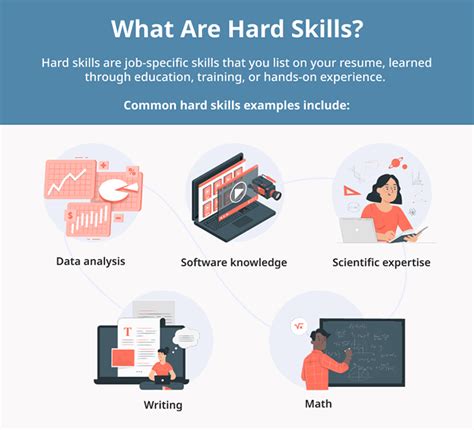Understanding Hard Skills: Definition And Examples

Hard skills refer to specific technical abilities or knowledge that are required to perform a particular job or task. These skills are usually acquired through formal education or training and can be measured and validated through certifications, assessments, or tests. In contrast to soft skills, which are more personality-driven and relate to interpersonal communication and emotional intelligence, hard skills are tangible and quantifiable. In this article, we will define hard skills, provide examples, and explain why they are important in the workplace.
What are Hard Skills?
Hard skills are specific technical skills or knowledge that are necessary to perform a job or task effectively. They are typically acquired through training, education, or experience and can be measured and tested. Examples of hard skills include:
- Programming languages (e.g., Java, Python, C++)
- Computer software (e.g., Microsoft Office, Adobe Creative Suite)
- Data analysis (e.g., Excel, SQL, Tableau)
- Mathematics (e.g., statistics, calculus, algebra)
- Technical writing and documentation
- Engineering design and analysis
- Machine operation and maintenance
Why are Hard Skills Important?
Hard skills are important in the workplace because they enable individuals to perform their jobs effectively and efficiently. They are often the minimum requirements for a particular position and can be used to assess a candidate’s qualifications. Hard skills are also essential for career advancement and can lead to higher salaries, promotions, and other opportunities.
Benefits of Hard Skills
Some of the benefits of having strong hard skills include:
- Increased productivity and efficiency
- Higher job performance and quality
- Greater job satisfaction and confidence
- Improved career prospects and advancement opportunities
- Higher salaries and compensation
How to Develop Hard Skills
There are several ways to develop hard skills, including:
- Formal education (e.g., degree programs, certifications)
- On-the-job training and experience
- Self-directed learning (e.g., online courses, tutorials, books)
- Volunteer work or internships
Examples of Hard Skills
Here are some examples of hard skills in various industries:
Information Technology
- Programming languages (e.g., Java, Python, C++)
- Web development (e.g., HTML, CSS, JavaScript)
- Database management (e.g., SQL, Oracle, MySQL)
- Network administration and security
- Cloud computing (e.g., Amazon Web Services, Microsoft Azure)
Business and Finance
- Financial analysis and modeling
- Accounting and bookkeeping
- Marketing and advertising
- Project management
- Business strategy and planning
Engineering
- Mechanical design and analysis
- Electrical and electronic engineering
- Civil and structural engineering
- Chemical and process engineering
- Aerospace and defense engineering
Healthcare
- Medical diagnosis and treatment
- Nursing and patient care
- Pharmacology and drug administration
- Medical coding and billing
- Medical research and clinical trials
Conclusion
Hard skills are specific technical abilities or knowledge that are required to perform a particular job or task effectively. They are essential for career advancement, job performance, and overall success in the workplace. Developing hard skills can be achieved through formal education, on-the-job training, self-directed learning, and other means. Examples of hard skills can be found in various industries, including information technology, business and finance, engineering, and healthcare.
FAQs
What is the difference between hard skills and soft skills?
Hard skills are specific technical abilities or knowledge that are required to perform a particular job or task effectively, while soft skills are personality-driven and relate to interpersonal communication and emotional intelligence.
Can hard skills be learned?
Yes, hard skills can be learned through formal education, training, and experience. Self-directed learning and on-the-job training are also effective ways to develop hard skills.
What are some examples of hard skills in the healthcare industry?
Examples of hard skills in the healthcare industry include medical diagnosis and treatment, nursing and patient care, pharmacology and drug administration, medical coding and billing, and medical research and clinical trials.
Why are hard skills important in the workplace?
Hard skills are important in the workplace because they enable individuals to perform their jobs effectively and efficiently. They are often the minimum requirements for a particular position and can be used to assess a candidate’s qualifications. Hard skills are also essential for career advancement and can lead to higher salaries, promotions, and other opportunities.
